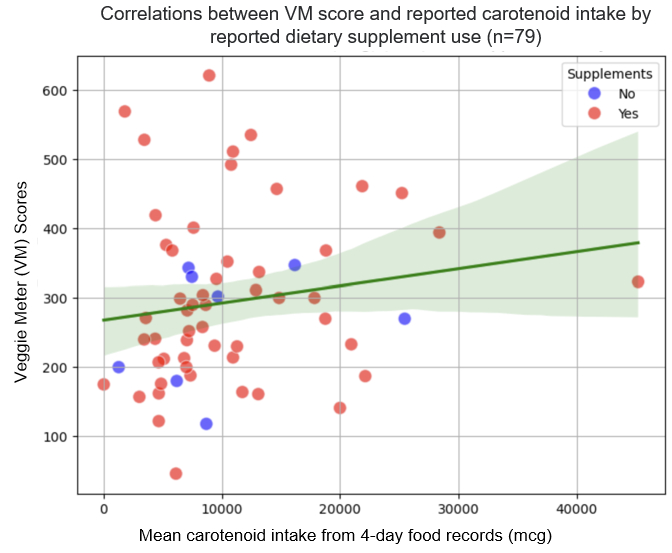Final ID: P1114
Correlations Between VeggieMeter and Self-reported Carotenoid, Fruit and Vegetable Intake Among Older Adults: Results from Bringing the Diabetes Prevention Program to Geriatric Populations
Abstract Body: Background: Fruit and vegetable intake (FVI) among older adults remains below recommended levels for disease prevention. Subjective dietary assessment can be burdensome and costly. Reflection spectroscopy (RS) can be used to non-invasively assess skin carotenoids as a biomarker of fruit and vegetable intake but is an underexplored research area for older adult communities.
Objective: To test the hypothesis that VM scores will be positively correlated with self-reported vegetable and carotenoid intake among older adults.
Design: This is a secondary analysis of data from an ongoing NIH-funded randomized, controlled trial where participants were counseled to make healthy changes including increased FVI. Participants were n=79 older adults (age ≥ 65 years) with prediabetes and had their skin carotenoids levels (scored 0-800) measured by VeggieMeter® - a portable device that uses RS technology. We performed univariate descriptive analyses of population characteristics, Spearman correlations, and linear regression models to examine the association between VM scores and self-reported FVI and carotenoid intake measured by food records (mean days=5.5 (sd=1.0)), adjusted for participant characteristics, using Python.
Results: Participants were 73.0 (sd=5.4) years old, 65.8% were female, 68.4% White, 13.9% Hispanic/Latinx, with an average BMI of 32.4 (sd=4.2) kg/m2 and 68.4% reported use of dietary supplements. The average FVI was 3.7 (sd=2.0) servings per day, reported carotenoid intake was 10,202 (sd=7,755) mcg, and mean VM score was 294.2 (sd=121.1). VM score was not correlated with self-reported FVI, vegetable intake alone, or fruit intake alone (all p>0.05). VM scores were correlated with carotenoid intake (R=0.25, p<0.05), but this correlation was no longer significant after adjustment for age, sex, race, ethnicity, BMI, smoking status, and reported supplement use.
Conclusions: This study supports the hypothesis that VM score is correlated with self-reported carotenoid intake reported on food records, suggesting potential utility of VM in assessing carotenoid status among older adults with prediabetes. Future work will examine sensitivity to change after participation in a Diabetes Prevention Program adapted for older adults.
Objective: To test the hypothesis that VM scores will be positively correlated with self-reported vegetable and carotenoid intake among older adults.
Design: This is a secondary analysis of data from an ongoing NIH-funded randomized, controlled trial where participants were counseled to make healthy changes including increased FVI. Participants were n=79 older adults (age ≥ 65 years) with prediabetes and had their skin carotenoids levels (scored 0-800) measured by VeggieMeter® - a portable device that uses RS technology. We performed univariate descriptive analyses of population characteristics, Spearman correlations, and linear regression models to examine the association between VM scores and self-reported FVI and carotenoid intake measured by food records (mean days=5.5 (sd=1.0)), adjusted for participant characteristics, using Python.
Results: Participants were 73.0 (sd=5.4) years old, 65.8% were female, 68.4% White, 13.9% Hispanic/Latinx, with an average BMI of 32.4 (sd=4.2) kg/m2 and 68.4% reported use of dietary supplements. The average FVI was 3.7 (sd=2.0) servings per day, reported carotenoid intake was 10,202 (sd=7,755) mcg, and mean VM score was 294.2 (sd=121.1). VM score was not correlated with self-reported FVI, vegetable intake alone, or fruit intake alone (all p>0.05). VM scores were correlated with carotenoid intake (R=0.25, p<0.05), but this correlation was no longer significant after adjustment for age, sex, race, ethnicity, BMI, smoking status, and reported supplement use.
Conclusions: This study supports the hypothesis that VM score is correlated with self-reported carotenoid intake reported on food records, suggesting potential utility of VM in assessing carotenoid status among older adults with prediabetes. Future work will examine sensitivity to change after participation in a Diabetes Prevention Program adapted for older adults.
More abstracts on this topic:
A Contemporary Machine Learning-Based Risk Stratification for Mortality and Hospitalization in Heart Failure with Preserved Ejection Fraction Using Multimodal Real-World Data
Fudim Marat, Weerts Jerremy, Patel Manesh, Balu Suresh, Hintze Bradley, Torres Francisco, Micsinai Balan Mariann, Rigolli Marzia, Kessler Paul, Touzot Maxime, Lund Lars, Van Empel Vanessa, Pradhan Aruna, Butler Javed, Zehnder Tobias, Sauty Benoit, Esposito Christian, Balazard Félix, Mayer Imke, Hallal Mohammad, Loiseau Nicolas
A novel method for measuring HDL-bound unconjugated bilirubin using an eel fluorescent protein reveals its association with reduced coronary artery diseaseFujioka Tomoo, Iino Takuya, Toh Ryuji, Harada Amane, Nagao Manabu, Shinohara Masakazu, Ishida Tatsuro, Otake Hiromasa

